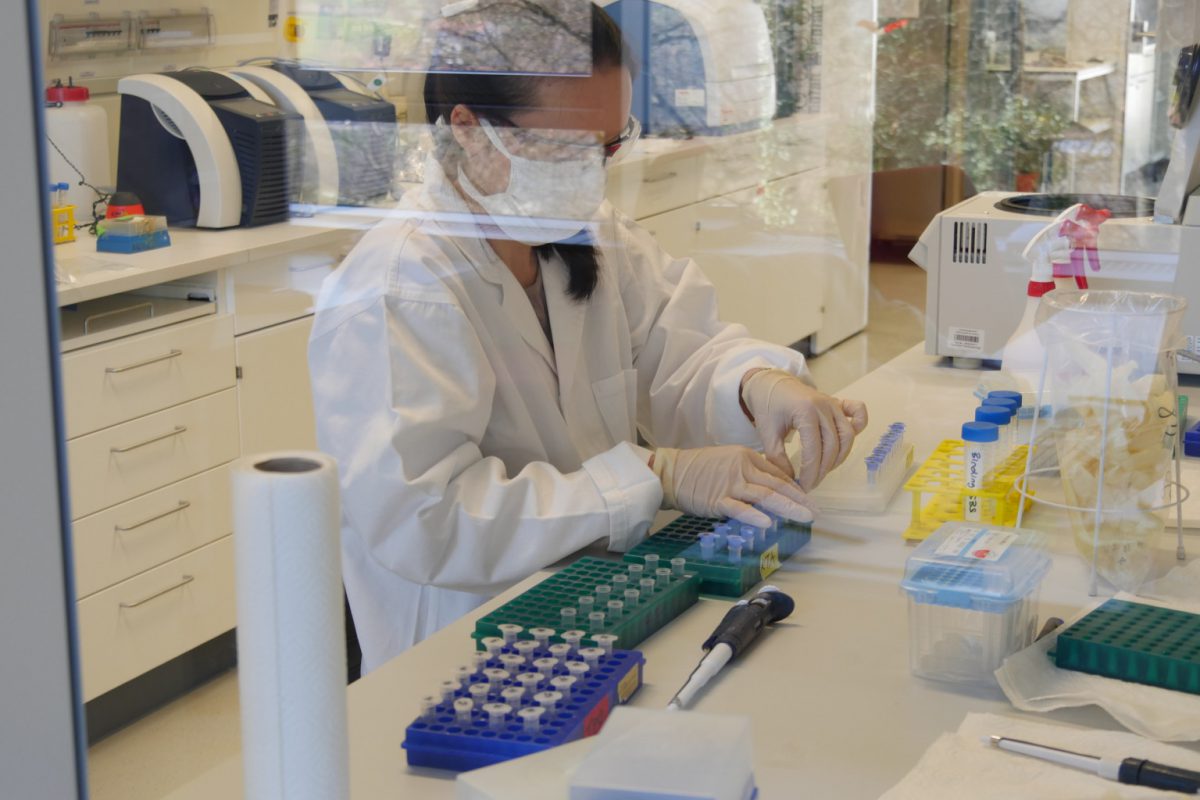The SARS-CoV-2 pandemic was and still is a tremendous challenge for all institutions of higher education. Though it already became clear in spring 2020 that students belong to the age group with the lowest risk of serious COVID19 disease, university teaching and campus life were severely affected by state- and country-wide lockdown measures. In particular, hands-on teaching in experimental science, a cornerstone of higher education in the natural sciences, was made almost impossible. As vaccination was a distant hope in early 2020, the only viable option for safe classroom teaching was broad and regular SARS-CoV2 surveillance. Yet, clinical diagnostic laboratories were already strained beyond capacity and even laboratory supplies needed for viral diagnostics were running short. Faced with this dire situation, a team of researchers from the Departments of Biology and Chemistry at the University of Konstanz took things into their own hands.
Using the available know-how and technological resources of a Young European Research University and in consultation with local health authorities, the team developed and implemented an in-house testing and SARS-CoV-2-surveillance system. Since fall 2020, this system has been in place to help steering the University of Konstanz safely through rough and unpredictable times. The University of Konstanz’ campus-wide voluntary SARS-CoV-2 screening system can serve as a best-practice example of how basic scientists can not only rapidly deliver solutions, but also how they can directly benefit their own institution.
Back in spring 2020, when the first wave of SARS-CoV2 infections forced public and academic life into gridlock, university researchers made their first encounters with the slow moving process of official COVID-19 testing. Suspected cases of viral infection amongst staff or students had to be sent to their general practitioner, who then took nasal swabs, which were sent in for RT-PCR testing in licensed medical diagnostic labs, still the gold standard in SARS-CoV-2 diagnostics. However, the response time from the initial suspicion to the confirmatory laboratory test often took several days up to a week. In the meantime, a whole class of students including their instructors, who had been in contact with the suspected case, had to quarantine, a complete no-go for every practical course. Acquainted with molecular biology and the handling of infectious organisms, researchers in the group of Professor Christof Hauck in Biology teamed up with their colleagues from Professor Andreas Marx’ group in the Department of Chemistry, who had developed a novel enzyme. This enzyme was produced in large quantities by a local university spin-off, myPOLS Biotec, founded by Professor Marx. With limitless supply of the enzyme at hand and in collaboration with the local hospital and clinical lab, the team developed a novel diagnostic approach in no time (Kuiper et al. (2020) PLoS One, doi: 10.1371/journal.pone.0241740).
The simplified assay takes advantage of the peculiar properties of the engineered enzyme: it functions as a DNA-polymerase and can amplify a DNA template in a standard polymerase chain reaction (PCR), but it also can function as a so-called reverse transcriptase (RT), which translates a RNA sequence into DNA. This double function makes this enzyme ideally suited for RNA virus detection by RT-PCR, as it can first reverse transcibe (RT) the viral RNA into DNA, and next amplify the DNA by PCR so that the presence of the SARS-CoV-2 virus can be detected in one go. What’s more, the enzyme is heat-stable and very robust, so that it functions with unprocessed patient samples bypassing the need to purify the viral RNA first.
To deploy this methodology on a campus-wide scale, existing infrastructure, such as microbio-labs for handling infectious material, RT-PCR-machines to run the tests, and terminals to register the individual samples via bar coded student-ID cards, was strung together. Currently, 400-500 samples are handed in every morning, with individual test results returned via email back to participants around early afternoon. As the RT-PCR-based test is sensitive enough to detect infected persons before they can transmit the virus, the surveillance system effectively prevents infection chains on site. Further refinement of the testing routine, such as sampling by gargle lavage instead of nasal swabs (Zander et al. (2021) Microbiol Spec., in press) has made it easy for staff and students to participate repeatedly throughout term. Today, this testing method is CE-certified and officially accepted by health authorities. Accordingly, the University Konstanz test certificate can be used in private life to get access to restaurants or cultural events or even for border crossing.
Overall, the campus-wide screening programme is a success story that shows how recent results from fundamental research can be quickly put into practice through effective collaboration between university departments as well as with local partners outside the university.
Click here to read more about the screening!
Contact information: University of Konstanz, Communications and Marketing; email: kum@uni-konstanz.de










